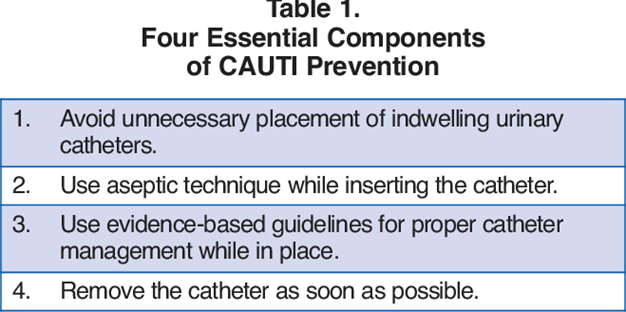The nurse is assessing a patient with a urinary catheter.
Which of the following would be a priority nursing intervention?
Removing the catheter as soon as possible to prevent infection.
Ensuring that the catheter is properly secured to prevent accidental dislodgement.
Encouraging the patient to drink fluids to prevent dehydration.
Administering antibiotics to prevent infection.
Administering antibiotics to prevent infection.
The Correct Answer is A

This is because urinary catheters are a common source of catheter associated urinary tract infections (CAUTIs), which can lead to complications such as pyelonephritis, sepsis, and renal failure. Therefore, the nurse should remove the catheter as soon as possible to reduce the risk of infection and promote normal urinary function.
Choice B is wrong because ensuring that the catheter is properly secured to prevent accidental dislodgement is not a priority intervention for a patient with a urinary catheter.
While this is an important nursing action to prevent trauma and bleeding, it does not address the main complication of catheterization, which is infection.
Choice C is wrong because encouraging the patient to drink fluids to prevent dehydration is not a priority intervention for a patient with a urinary catheter.
While this is a good nursing practice to maintain hydration and renal perfusion, it does not affect the risk of infection associated with catheterization.
Choice D is wrong because administering antibiotics to prevent infection is not a priority intervention for a patient with a urinary catheter.
While this may be indicated for some patients who have signs and symptoms of UTI or who are at high risk of infection, it is not a routine measure for all patients with catheters and may contribute to antibiotic resistance.
Nursing Test Bank
Naxlex Comprehensive Predictor Exams
Related Questions
Correct Answer is ["A","C","D"]
Explanation
Furosemide is a loop diuretic that causes the kidneys to excrete more water and salt, which can lead to dehydration and electrolyte imbalance.

Electrolyte imbalance can cause muscle cramps, numbness and tingling, weakness and fatigue, and other symptoms.
Therefore, the client should monitor for these signs and report them to the doctor if they occur.
Choice B is wrong because dry mouth is not a sign of electrolyte imbalance, but rather a sign of dehydration.
Dehydration can also cause thirst, decreased urination, drowsiness, and confusion.
Choice E is wrong because tachycardia is not a sign of electrolyte imbalance, but rather a sign of hypovolemia (low blood volume) or hypotension (low blood pressure).
Furosemide can lower blood pressure by reducing fluid volume in the body.
Therefore, the client should also monitor their blood pressure and pulse regularly while taking furosemide.
Correct Answer is ["23"]
Explanation
The correct answer is 22.5 mL.
To find the amount of mL, use the formula: (desired dose / available dose) x available volume.
In this case, desired dose = 30 mEq, available dose = 20 mEq, and available volume = 15 mL.
Plug these values into the formula: (30 mEq / 20 mEq) x 15 mL = 22.5 mL.
However, since the instructions say to round to the nearest whole number for adult clients, the final answer is 23 mL.
Whether you are a student looking to ace your exams or a practicing nurse seeking to enhance your expertise , our nursing education contents will empower you with the confidence and competence to make a difference in the lives of patients and become a respected leader in the healthcare field.
Visit Naxlex, invest in your future and unlock endless possibilities with our unparalleled nursing education contents today
Report Wrong Answer on the Current Question
Do you disagree with the answer? If yes, what is your expected answer? Explain.
Kindly be descriptive with the issue you are facing.
